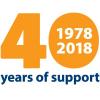Bel Mooney:
It must be so hard for people to imagine a time when there was no help for the mothers or fathers of stillborn babies, and no understanding of the perfect grief can have for years. After all, how can such issues be addressed if they are never acknowledged?
That is how it was at the end of 1975, when my second son was stillborn. Looking back I can remember a terrible silence.
As a journalist I was able to pour my grief into words – and tell the readers of The Guardian how it felt to bear a stillborn child. The rest is history.
There is still much work to be done in addressing totally unacceptable standards – those shocking statistics which mask the incalculable sorrow of so many families.
I give thanks for Sands and for their hard work which ensures that no grieving parent nowadays need ever reach out and find no help there.
Hazelanne Lewis:
In 1975, I gave birth to a baby boy who was stillborn. At the time, partners were not encouraged to be with you during labour. Maternity units acted on an ‘out
of sight, out of mind' basis, with the stillborn baby being whisked away before the mother could see him.
Partners were told to register the birth and grant permission to the hospital to bury the baby. They were advised not to talk to the mother about the baby as that would upset her. Never mind the fact that fathers also had feelings. It’s difficult to mourn your baby with no tangible memories. People cross the road to avoid talking to you. The thought of the next baby was offered as a sticking plaster to cure the pain of the loss.
I reached out through the press to try and gain support for educating professionals on the needs of bereaved parents. The response from bereaved parents was overwhelming and indicated a clear need for support. From that I went on to found Sands.
I am stunned by how Sands has grown into the effective, influential organisation it is today. I had hopes 40 years ago that it would be a viable organisation, but never dreamt it would be as powerful as it is.
Clea Harmer, Chief Executive, said: “Forty years ago, two bereaved mothers found there was no support available for parents whose babies had died. After giving birth to their stillborn babies in the mid-1970s, Bel Mooney, a journalist, wrote an article for The Guardian describing her experience and Hazelanne Lewis, a psychiatric social worker, wrote to national newspapers asking bereaved parents to contact her to share their stories.
The avalanche of replies from all over the UK revealed the vast, unrecognised need for support and advice for bereaved parents and their families upon the death of their baby. As a result Sands was formed in 1978. At that time in the UK, most parents were not allowed to see, hold or bury their babies. No photographs were taken, and they could not put their baby’s name on the stillbirth certificate.”
Bel and Hazelanne have been nominated as part of 40 volunteers for #Sands40.
Sands is marking its 40th anniversary this year and we would like to say thank you for the incredible support and contribution that our dedicated volunteers make across the UK to support bereaved parents and anyone affected by the death of a baby.

